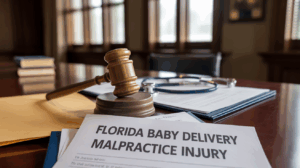
Anoxic brain injuries can have life-changing consequences. If an anoxic brain injury was caused by medical malpractice, and you or someone you love was the victim, you may have the right to pursue a legal claim.
If you’ve sustained an anoxic brain injury, it’s time to take action. A Fort Lauderdale medical malpractice lawyer can help you build a strong claim and obtain the compensation you deserve.
What Should You Do If an Anoxic Brain Injury Was Caused By Medical Malpractice?
If you believe that you or someone you love has suffered an anoxic brain injury caused by medical negligence, take these steps:
- Get immediate medical care: Get treated at a facility equipped to handle brain injuries.
- Document everything: Keep a written record of all symptoms, doctor communications, and medical visits.
- Request medical records: Obtain copies of test results, treatment notes, and hospital reports as soon as possible.
- Ask direct questions: Clarify the cause of the injury and whether oxygen deprivation was involved.
- Consult a malpractice attorney: Our lawyers can review your records and determine whether you have grounds for a claim.
Common Medical Errors Leading to Anoxic Brain Injuries
Even skilled medical professionals can make serious mistakes that restrict oxygen flow to the brain. Some of the most common ones include:
- Surgical errors: These mistakes can block a patient’s airway or interfere with breathing during an operation, leading to oxygen deprivation.
- Anesthesia complications: Improper dosing or a failure to monitor oxygen levels while a patient is under anesthesia can cause serious and preventable brain injuries.
- Medication errors: Administering the wrong drug or dosage can suppress respiration or cause dangerous interactions that reduce oxygen flow to the brain.
- Failure to monitor patients: When medical staff overlook warning signs of respiratory distress or oxygen loss, patients can suffer irreversible harm.
- Delayed diagnosis or treatment: Failing to recognize and treat conditions like cardiac arrest, stroke, or respiratory failure in time can result in devastating oxygen deprivation.
When hospital systems break down—whether through poor communication, equipment failure, or staff negligence—the result can be irreversible brain damage. Recognizing these causes can help you determine whether a preventable medical mistake contributed to your injury.
Understanding Anoxic Brain Injuries
An anoxic brain injury happens when the brain is deprived of oxygen, even briefly. Since brain cells begin to die within minutes, the effects can be permanent. Victims may experience memory loss, motor impairment, speech difficulties, or personality changes.
The extent of the damage depends on how long the brain went without oxygen. Even a short lapse can have catastrophic effects. Swift medical intervention is crucial to minimize long-term harm.
In some cases, these injuries are the result of medical negligence. If a doctor, nurse, or hospital failed to act appropriately or made an error that deprived your brain of oxygen, you may have grounds for a malpractice claim.
Recognizing the Signs and Symptoms
Anoxic brain injuries can progress rapidly, which is why early recognition is vital. The warning signs of an anoxic brain injury include:
- Sudden confusion or disorientation
- Slurred speech or difficulty speaking
- Loss of consciousness
- Coordination or balance problems
- Seizures, headaches, or vision changes
If you notice any of these symptoms after a medical procedure, it’s crucial to take action. Each minute without oxygen increases the risk of permanent damage. If something feels wrong, seek medical attention right away.
Proving Liability in Medical Malpractice Cases
To prove liability in a malpractice claim, you must show that a healthcare provider’s negligence directly caused the injury. This involves establishing three key elements:
- Duty of care: The provider was responsible for delivering care that met accepted medical standards.
- Breach of duty: The provider failed to meet that standard through an action or inaction that another competent professional would have avoided.
- Causation and damages: The breach directly caused measurable harm, including the anoxic brain injury and related losses.
Our attorneys can gather evidence and consult medical experts who can help show how your doctor’s conduct deviated from accepted practice and how that failure caused your injury.
Possible Compensation for Anoxic Brain Injury Victims
An anoxic brain injury can change every aspect of your life. The compensation from a medical malpractice claim is meant to help you recover financially, physically, and emotionally.
Types of Recoverable Damages
Victims of preventable anoxic brain injuries can pursue a variety of damages, including:
- Medical expenses: You can seek damages for hospital stays, rehabilitation, medications, and long-term care.
- Lost wages and future earnings: You can pursue compensation if your injury prevents you from working or limits your earning potential.
- Pain and suffering: You can claim damages for physical pain, emotional distress, and loss of enjoyment of life.
- Loss of companionship: You can recover compensation if the injury affects your relationships with family members.
- Punitive damages: You can pursue these damages if the medical provider’s conduct was especially reckless or showed a blatant disregard for your safety.
Factors Influencing Compensation Amount
The value of an anoxic brain injury case depends on several factors, including:
- Injury severity: More severe, life-altering injuries typically result in higher compensation.
- Age and earning capacity: Younger victims or those with significant career potential may be entitled to larger awards.
- Long-term medical needs: The cost of ongoing care, therapy, and home modifications plays a major role in settlement calculations.
- Evidence of negligence: Strong proof that medical errors caused the injury can increase your settlement’s value.
Our attorneys can estimate the potential value of your claim based on the specifics of your case.
How The Law Offices of Anidjar & Levine Can Support You
When you choose The Law Offices of Anidjar & Levine, you’ll receive personal attention and direct access to your attorney. You don’t pay any legal fees unless we recover compensation for you, so there’s no financial risk in pursuing your claim.
Personalized Legal Representation
An anoxic brain injury case demands focused, aggressive advocacy. The team at Anidjar & Levine takes time to understand how your injury has changed your life and builds a legal strategy tailored to your needs. Our attorneys have extensive experience handling brain injury cases in Florida and know how to secure compensation for victims.
Direct Attorney Communication
When you work with Anidjar & Levine, you’ll have direct access to your attorney from start to finish. We prioritize open communication and give our clients regular updates on their cases. You’ll never be left wondering about the status of your case, and your attorney will always be a phone call away.
No Upfront Legal Fees
You won’t pay anything unless our firm successfully recovers compensation for you. This contingency fee arrangement lets you focus on your recovery while our legal team handles your case.
Moving Forward After a Life-Altering Injury
If you believe your anoxic brain injury was caused by medical negligence, you need legal representation. A medical malpractice lawyer from Anidjar & Levine can review your records, gather proof of negligence, and negotiate aggressively for the compensation you deserve.
Our legal team can handle every part of your claim so you can focus on your recovery. Book a free consultation to get legal help today.










